
Covid-19 explained in 26 languages
The Coordination Office for the Mediterranean of the International Organization for Migration (IOM) has produced an information leaflet on Covid-19, translated into 26 languages, and also published on the Italian IOM website www.italy.iom.int.
The initiative “intends to respond to the need to inform the largest number of people on how to defend themselves from the transmission of the virus in a context in which knowing what to do is of fundamental importance. “We have received the message of those foreign communities who, alarmed by the seriousness of the situation, have communicated the need to be able to inform even those who do not speak the Italian language perfectly” recalls Laurence Hart, the director of the IOM Coordination Office for the Mediterranean. The flyer contains brief explanations on the transmissibility of the virus and describes the basic rules to be followed in Amharic, Arabic, Bambara, Bengali, Chinese, Kurdish, Edo, English, Esan, French, Fula, Igbo, Italian, Mandinka, Hausa, Pashtu, Pidgin. Romanian, Russian, Somali, Soninke, Spanish, Tigrinya, Urdu, Wolof, Yuruba.
“We are receiving requests for translations into other languages, which will soon be available” continued Hart, “we hope that this information can be disseminated as widely as possible, both through the foreign communities we are in contact with, and through both social media and the usual media, but also n other channels. At the same time, we hope that our translation work can also be disseminated, especially within the numerous reception facilities for migrants, scattered throughout Italy.”
This is the link to the download of the flyer, translated for now in 26 languages:
https://italy.iom.int/sites/default/files/news-documents/LeafletIOMCovid19.pdf
This is the link to the download of the individual files:
https://italy.iom.int/it/covid-19-brochure-informative
Traduzione di Valentina Fries

